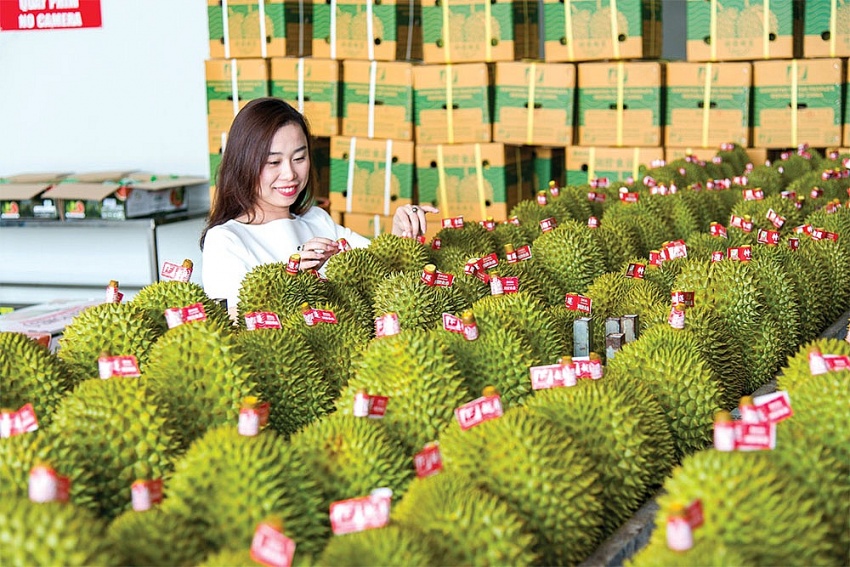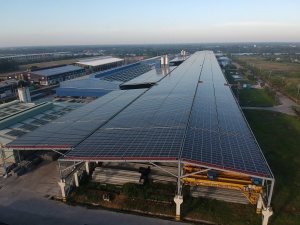Financial institutions ready to provide greener agro-loans
 |
| Vietnam’s agricultural leaders have committed to reducing greenhouse gas emissions, photo Le Toan |
HSBC is in the process of closing a green loan for a local company in the farming and seafood industry, following ASEAN’s first Push facility to Nutifood to support capital expenditures and working capital.
HSBC is leading the way to meet the client’s sustainability needs and making good progress with its commitment, achieving roughly 14 per cent of its targets by completing a number of notable green transactions for clients with solutions ranging from green trade financing options to sustainability-linked loans to sustainable supply chain finance.
Such climate commitments of financial institutions open up a world of opportunity for agriculture companies to tap into green finance to support their growth and sustainability agenda.
Surajit Rakshit, head of Global Trade and Receivables Finance at HSBC Vietnam, said, “As one of the world’s largest financial institutions with far-reaching international connectivity, which has committed to and seriously involved in net-zero transition since the very early stage, our support for agriculture companies goes beyond banking solutions. Whether they need guidance, financing or insights, we can support their business to prepare for the transition.”
“This is clearly in line with HSBC’s overall sustainability strategy, and we have been helping clients to foster this with our strong capability in the space. Our sustainability strategy has, at its core, a commitment to support our customers to understand and act on their transition to lower emissions and to help them achieve their wider sustainability ambitions,” he said.
In 2022, HSBC Vietnam announced a commitment to arrange up to $12 billion of direct and indirect sustainable financing for Vietnam and the corporate sector in the country by 2030.
Green loans from international organisations are a critical buoy for agriculture companies as increasingly firms are paying more attention to support their ecosystem and have become more interested in solutions such as supply chain financing or distributor financing. This also becomes one of their competitive advantages when competing in the fierce pricing environment.
Minister of Agriculture and Rural Development Le Minh Hoan said one of the industry’s major targets in 2023 is to optimise international financing in agricultural development.
“The local authorities target to earn $70 billion from exports of agricultural, forestry, and fishery products by 2030, while foreign direct investment is expected to reach roughly $25 billion. Vietnam will also likely benefit from 30 gratis-aid initiatives with $300 million over the next five years,” Hoan said.
Data from the State Bank of Vietnam’s (SBV) Credit Department for Economic Sectors showed that as of the end of last year, outstanding loans for green projects increased by 12.96 per cent against the end of 2021 to more than VND500 trillion ($21.25 billion) accounting for more than 4.2 per cent of the total outstanding loans of the whole economy. The loans mainly focus on green agriculture, renewable energy, and clean energy.
The government is also focusing on tackling one of the most pressing challenges – climate change – to help the agriculture sector to thrive sustainably. Due to Vietnam’s geographic exposure, it is particularly susceptible to climate change, which has a serious effect on agriculture.
The government in the recent past approved the National Green Growth Strategy for the decade, an important policy move for the country’s economic growth and sustainable development, with specific goals related to greenhouse gas emission reductions. The commitment to reduce agricultural emissions has also been declared in the Ministry of Agriculture and Rural Development’s action plan to implement the strategy.
Since the adverse impacts of climate change are better understood, many financial institutions operating in Vietnam are taking bold steps to finance and facilitate green and eco-friendly loan packages as an essential part of their sustainable investment and net-zero pledges.
The SBV said that the country had 31 financial institutions involved in green credit, with a total credit of more than $12.4 billion, mainly in green agriculture and renewable energy. Eco-friendly credit and green bond issuance have received great attention, as these debt instruments can promote a lower-carbon and a more resilient economy.
 | Green finance for a sustainable future Sustainability is no longer just desirable, there is mounting pressure for businesses and individuals to play their part in addressing the climate crisis. |
 | Green finance and technology solutions for net-zero emissions As climate change has become a serious international issue, many countries have taken action to reduce greenhouse gas emissions and achieve net-zero emissions by 2050. In Vietnam, the government has made a tremendous effort to combat climate change by ratifying the Paris Climate Agreement in 2016, pursuing the National Green Growth Strategy for 2021-2030, and implementing the Law on Environmental Protection which came into effect at the beginning of 2022. |
 | Singapore expands green finance plan The Monetary Authority of Singapore (MAS) has announced that to decarbonise the economy, Singapore will expand its focus, which is now solely on green finance, to the one that also includes transition finance by mapping out clear definitions, encouraging innovation and extending grants. |
What the stars mean:
★ Poor ★ ★ Promising ★★★ Good ★★★★ Very good ★★★★★ Exceptional
Related Contents
Latest News
More News
- Masan Consumer names new deputy CEO to drive foods and beverages growth (February 23, 2026 | 20:52)
- Myriad risks ahead, but ones Vietnam can confront (February 20, 2026 | 15:02)
- Vietnam making the leap into AI and semiconductors (February 20, 2026 | 09:37)
- Funding must be activated for semiconductor success (February 20, 2026 | 09:20)
- Resilience as new benchmark for smarter infrastructure (February 19, 2026 | 20:35)
- A golden time to shine within ASEAN (February 19, 2026 | 20:22)
- Vietnam’s pivotal year for advancing sustainability (February 19, 2026 | 08:44)
- Strengthening the core role of industry and trade (February 19, 2026 | 08:35)
- Future orientations for healthcare improvements (February 19, 2026 | 08:29)
- Infrastructure orientations suitable for a new chapter (February 19, 2026 | 08:15)

 Tag:
Tag:



















 Mobile Version
Mobile Version